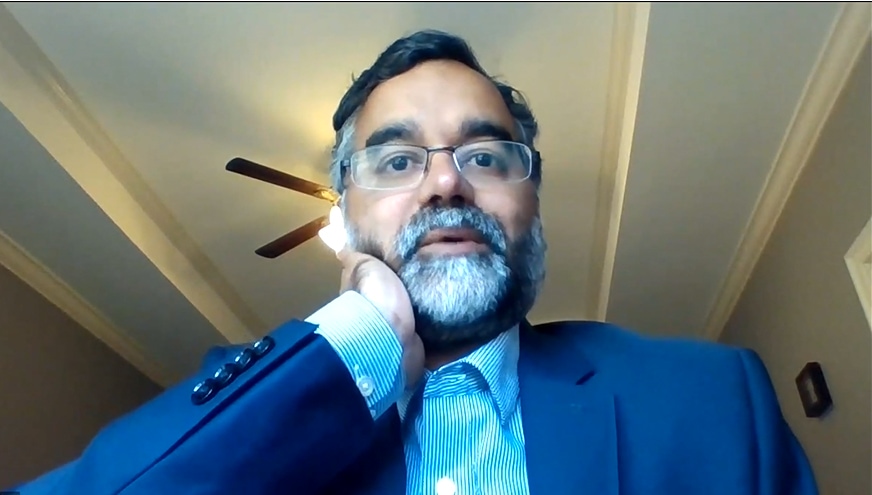View Larger Image

Tuhin Virmani, M.D., addresses participants in the virtual symposium.
Virtual Parkinson’s Symposium Shares Tips, Hope, Treatment
| Parkinson’s disease patients, caregivers and medical professionals gathered virtually April 11 to learn about ways to keep the disease under control and deal with related psychological, cognitive and intimacy issues.
The University of Arkansas for Medical Sciences (UAMS)’ Sixth Annual Parkinson’s Symposium was watched from about 120 locations, some with multiple viewers present. The 1.5 hour session, shortened from the usual four hour in-person event in years past, illustrated how UAMS’ multi-disciplinary approach helps patients handle the various components of the disease.
Speakers offered hope for the development of new treatments and stressed the need for patients to actively participate in minimizing and prolonging the onset of symptoms through daily activities, rather than just during appointments at UAMS’ Movement Disorders Clinic. The clinic’s comprehensive program includes neurologists, neurosurgeons, neuropsychologists, physical therapists, researchers, speech-language pathologists and other specialists.
Rohit Dhall, M.D., director of neurodegenerative disorders at UAMS, emphasized that the solutions offered by experts who focus on different aspects of Parkinson’s, several of whom may be seen in one visit, are much more effective when reinforced outside the clinic.
“The type of care we’re envisioning here cannot be delivered in 30 minutes of instruction that you get once every few months in the clinic,” he said. “That interaction has to be much broader, involving family members, and much more regular, through multiple channels.”
The clinic, which is constantly expanding its services and number of specialists, averages 1,500 to 1,800 patients a year. Most of the services are available both in person and through UAMS’ telemedicine network.
Dhall and Mitesh Lotia, M.D., a UAMS movement disorders neurologist, urged Parkinson’s patients to enroll in clinical trials available through the clinic, and encourage people with a family history of Parkinson’s to undergo genetic testing, which is readily available though often not done because of the expense. Lotia said UAMS is working on making genetic testing more accessible with assistance from the National Parkinson’s Foundation.
Lotia and Tuhin Virmani, M.D., Ph.D. an associate professor in the Department of Neurology at UAMS, are seeking volunteers for a telemedicine trial that will deliver clinical care to Parkinson’s patients. This summer, Lotia also plans to begin an occasional virtual forum to answer questions from people newly diagnosed with the disease.
“We do have ways to make your life with Parkinson’s very well-controlled for a long period of time,” Virmani said.
A main theme of the symposium, echoed by many speakers, was that Parkinson’s patients shouldn’t let the disease define them.
Virmani urged patients to “keep that in mind and continue to be as active as possible. Don’t give up your hobbies. In fact, try to find more hobbies and more ways to exercise. We have found that exercise is one of the most important things you can do to improve motor symptoms, like gait and balance,” as well as to improve cognitive symptoms and slow the disease’s progression.
“Keep focused on living your life and try not to get bogged down by your diagnosis,” he advised a symposium participant who asked what a Parkinson’s patient should do in the first three years after being diagnosed.
Asked about the best types of exercise for Parkinson’s patients, Lotia replied, “The best type of exercise is the type you enjoy doing,” but that boxing, dancing, yoga and light weight-lifting are helpful, while running on a treadmill can be dangerous for some patients with balance issues.
While medication helps most Parkinson’s patients, deep brain stimulation is an option for a subset of patients with severe tremors that don’t respond well to medication, said Erika Petersen, M.D., a UAMS neurosurgeon. She has been performing the surgeries weekly since 2010 and said UAMS implants about 30 to 50 new DBS patients every year.
Asked about the possibility of a cure for Parkinson’s someday, Virmani said, “The best way to get a cure is to participate in studies so we can advance our knowledge about the disease. For a true cure, I think we’re going to have to diagnose people before they start manifesting those motor symptoms.”
Early diagnoses are “the biggest push right now” among Parkinson’s experts, he said, adding, “By the time you start having the symptoms you can actually see and diagnosis, the disease has probably already been going on for five to 10 years.”
The symposium also included speakers who shared solutions for Parkinson’s-related intimacy problems and cognitive issues.
Chelsea Wakefield, Ph.D., an associate professor in the Psychiatric Research Center who is also a certified sex therapist, led the segment on intimacy.
“Having Parkinson’s is not your entire identity,” Wakefield said. “The qualities of who you are can be expressed in other ways.”
She reminded the audience that “there are many kinds of intimacy,” naming sexual, intellectual, emotional and experiential, arising from shared experiences.
Because Parkinson’s impacts the central nervous system, she said, as it advances it will affect sexual function, which can lead to anxiety, misunderstandings and feelings of unattractiveness. When this happens, Wakefield said, “This needs to be discussed, explored, unpacked and reframed.”
Engaging in a series of shorter conversations about feelings and changes can go a long way toward easing anxiety, she said. “You don’t have to work through everything in one sitting. The important thing is for each partner to listen deeply, because the experience of having someone really get what you are going through deepens the connection and is profoundly healing.”
“We often project and interpret what the other person is thinking and feeling, without checking out those assumptions,” she cautioned.
Wakefield urged those with Parkinson’s-related intimacy issues to remember the mantra, “Body parts function. People relate.”
“This disease creates tremendous vulnerability, both in the patient and the partner,” she said, noting that a side effect of Parkinson’s — a lack of responsive facial expressions — can be misinterpreted and undermine intimacy, enhancing the need for discussion.
“Often, couples therapy will help,” she said, noting that a lot of patients or their partners may also require medication to overcome clinical depression arising from the changes Parkinson’s causes to their bodies.
In another segment, a patient of Lotia’s shared an unexpected positive career twist following her 2016 Parkinson’s diagnosis, when she was in her early 50s.
Shari Scriber said problems with dexterity as a result of the disease caused her to give up her beloved career teaching elementary school. Then one day her mother gave her a crayon and a coloring book. She balked, saying there was no way she had the dexterity to color between the lines of the intricate patterns. But her mother persisted, telling her that research showed coloring may help Parkinson’s patients improve their motor skills.
She gave it a try and discovered how therapeutic it was.
Then Scriber painted a colorful door-hanger with lots of detailed scrolls for her daughter’s dorm room, and suddenly was inundated with requests to make door hangers for her daughter’s friends and others. Moving the phone she used to participate in the symposium, she shared a 360-degree view of her colorful art studio with her virtual audience, noting that she recently filled her 500th order for the vibrant artwork she began creating two years ago.
“It actually relaxes me to the point where I don’t shake when I’m painting,” she said. “When I’m painting like this, it all stops.”
Scriber has even started holding art classes for Neurology Department residents’ wellness sessions called Let Thy patient be Thy teacher. Lotia said residents really enjoyed their time relaxing with their peers while painting under Scriber’s directions. Smiling, he told her, “You have been a tremendous inspiration for us all.”
“I have definitely redefined myself,” she replied.
Scriber also shared how exercising has helped her dexterity.
Acknowledging that fatigue sometimes requires her to nap two or three times a day, she said she nevertheless goes to the gym every day.
Chrystal Fullen, a post-doctoral neuropsychology fellow at UAMS who will be joining the faculty as an assistant professor in August, told participants that cognitive impairment, which includes problems focusing, planning, remembering, navigating or speaking, is very common with Parkinson’s disease, though the extent of impairment varies greatly. But the good news, she said, is that “we have interventions to help ease the burden of cognitive problems.”
The treatments, some as simple as improving sleep, can help boost day-to-day cognitive functioning, she said.
Through Fullen, UAMS will be offering programs to improve cognitive abilities this fall, including individual and group sessions that are covered by most forms of insurance and weekly cognitive stimulation therapy, which she said has proven very effective for Parkinson’s patients with dementia.
She invited any patients interested in cognitive programs to contact her directly at cfullen@uams.edu or 501-582-8264.
More information about the UAMS Movement Disorders Clinic is available by calling (501) 686-5838 or visiting our website.
A recording of the symposium is available online. To sign up for research opportunities discussed in the symposium, please visit: https://is.gd/uamsmdclinicresearch.

